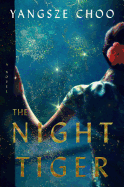
The Night Tiger is a complex, ambitious novel set against the intriguing backdrop of 1930s Malaya. In it, Yangsze Choo (The Ghost Bride) weaves together ancient Malayan superstitions and traditions to tell a story of missing fingers, man-eating tigers, dancehall girls, twins and even a train to the land of the dead.
Ren is 11 years old and charged with an impossible task: locate the severed finger of his now-deceased master, Dr. Macfarlane, and reunite it with the doctor's body. He has 49 days to do so, or else his master's soul will wander the earth. Wandering souls are awful enough in their own right, but made all the more dangerous because Dr. Macfarlane may have been a weretiger in his last living days. To further complicate matters, according to tradition, the finger cannot be returned willingly--it must be "taken or stolen."
Ren ends up in the employ of William Acton, a British doctor working at the Batu Gajah hospital, while the finger (which should be at the very same hospital) finds its way into the pocket of Ji Lin, a dancehall girl who discovers the unwelcome souvenir from one of her evening customers.
So begins the dance that threads through the rest of The Night Tiger. Ji Lin, half "rabidly curious" and half believing it's best to forget about it entirely, tries to return the missing finger to its rightful place, only to find it keeps coming back to her. Meanwhile, Ren tries desperately to locate the finger but is thwarted at every turn. Is it fate? Fortune? Or, as inexplicable deaths start to pile up around town, is it something more sinister?
As readers, we can see these missed connections from a bird's-eye-view of sorts; we know where the finger is, and where it should be, and who wants it. And we sense, intuitively, when an attempt to locate it (or return it) will fail. In less capable hands, this could feel gimmicky. But Choo pulls it off brilliantly, never once slipping into territory that feels silly or coincidental.
The magic of The Night Tiger, then, is not in where or what or even who. It is in the why of each of these things. Why does Ren stay so committed to his dead master's last wish? Why does Ji Lin rail against her family's expectations? Why do those around Dr. Acton come to inopportune--or too opportune, depending on one's perspective--ends? Choo builds characters that are rich and nuanced, with fully imagined backstories that are revealed slowly as the story builds. Each character has some secret to keep, and holds strongly to his or her beliefs. These secrets are part of each character's individual motivations; combined, they result in a series of dark events that leave everyone--including the reader--wondering what nefarious force might be at play behind the scenes: "A terrible suspicion is growing in him that there's a shadowy power that rearranges events to suit himself.... Like a dark fairy tale, where all your wishes, however evil and stupid, are granted. And perhaps, like fairy tales, there's a price to be paid in blood."
While The Night Tiger may not be a fairy tale in the most literal sense of the word, there are enough elements of the supernatural to give the novel the feel of a fable--eerie and a little bit magical. The aforementioned weretiger myth rears up in Dr. Macfarlane's death, and becomes something of a rumor as multiple deaths go unexplained. Ji Lin notes unlucky days (and lucky ones), and she and Ren both travel on a train to the land of the dead and speak with ghosts. Choo pulls these myths and traditions from a variety of sources, all rooted in Malay culture; as such, the supernatural elements of The Night Tiger become as much a part of the worldbuilding as the incredible historical detail packed into Choo's setting.
The Night Tiger is many things: a fine example of historical fiction, a work of magical realism, a ghost story, a mystery, a romance, a coming-of-age tale. Each of these is impressive, but most impressive is Choo's ability to weave them all together in a way that feels authentic, and to use that intricate process to tell a story of colonialism and self-determination, love and death, family and tradition. "I had the odd certainty," reflects Ji Lin toward the end of the novel, "that the ties binding all of us had been remade in a new and different pattern." It is a delight to watch Choo create this new pattern across the pages of The Night Tiger. --Kerry McHugh

